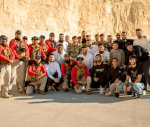You are here
‘Did they bang on the walls?’
Feb 27,2017 - Last updated at Feb 27,2017
Four years ago, I heard the story of a Yemeni who had to crouch down in the back of a merchandise-packed truck. I cannot remember if I was told how long that arduous journey took, but I think that it lasted more than 24 hours.
The Yemeni, who was not the only migrant labourer in the truck to be “smuggled” into Saudi Arabia, had no access to food, was unable to relieve himself and even prevented from uttering a word.
He physically survived the ordeal and garnered a little money, but the experience left indelible marks on his psyche, life and family. At least, he survived it.
His story is redolent of the stories of African Americans who tried to escape the shackles of slavery in the 19th century.
For instance, a “fugitive slave” named Henry “Box” Brown gained his freedom through mailing himself in a box so that he could be delivered to abolitionists in Philadelphia, Pennsylvania, in 1849.
The plan was facilitated by what was then called the Underground Railroad. Fortunately, he also made it, but not entirely without scars.
Both the Yemeni and the African American took hazardous paths and managed to overcome restrictions on movement, look for better economic opportunities and, more importantly, live — almost to the full — the potentiality of their humanity.
Their successes in crossing borders (literal or metaphorical, but in both cases imagined) were not necessarily a guarantee of fewer problems later. In fact, they continued to face injustice and destitution.
Theirs are nonetheless the stories of the luckier ones, the survivors.
Last Monday, one was reminded of the not-so-lucky ones: the dead — dare one say “the murdered”? — and the captured.
Thirteen African migrants or refugees (it is becoming more and more difficult to differentiate the two) died of suffocation in Libya.
They were “disposed of” near a checkpoint in Khoms, a town on the coast of Tripoli, Libya.
Prior to that, the traffickers had told the migrants that they would be transported on a boat across the Mediterranean to Italy. The departure point was the town of Bani Walid, and the journey took four full days.
In the meantime, the migrants were packed in the shipping container like sardines. As a result, thirteen suffocated.
One might ask: How did that happen? Why did they not knock on the walls of the container?
Similar questions might be asked about analogous situations.
In 2003, 19 Mexicans were left to die in the back of a milk trailer in Texas.
Last year, four Mexican migrant labourers likewise died in the back of a truck in the US.
Again, why did they not bang on the walls of the truck? (According to a witness to the former, the driver of the trailer did not pay attention to their knocking on the walls.)
The saga of such migrants and refugees was poignantly fictionalised in another context by Palestinian writer Ghassan Kanafani in his “Men in the sun”.
In it, three Palestinians strive to enter Iraq in the hope of getting to Kuwait, a country they perceive as a key to better life conditions.
The only reasonably priced method for them to reach Kuwait is to hide in a tanker truck and weather the scorching heat of the desert sun.
While the driver, Abul Khaizuran, is held by Kuwaiti customs’ officials through banter, the three men suffocate.
Before “dumping” them in a landfill, an act which resembles that of the traffickers of the Africans, Abul Khaizuran regretfully asks them: “Why did you not knock on the walls of the tank?”
It is very convenient to ask that question, as it serves two functions: posing it is the equivalent of blaming the victim, and the act also makes one believe that he or she has made a great contribution.
This way, the asking brings closure to the story.
But the story only begins then: the men must have knocked, or rather banged, on the walls, but they were not heard.
They were not heard, not because they were mute, but because the listeners are hard of hearing.
While the world has become a small village for a few, it has simultaneously become a ghetto (to paraphrase the title of Howard Winant’s “The world is a ghetto”) for refugees, migrants and the underprivileged.
The walls and bars of that ghetto are getting narrower and narrower.
The constant knocking of the oppressed is too resounding to be missed. Nevertheless, it seems that oppressors might only start to hear it when the knocking turns into a knocking down.
Instead of being confined to and contained within boxes, tanker trucks, trucks, trailers, boats, etc. and being considered disposable, in all probability the oppressed will no longer be containable.
Only then may the oppressors read the writing on the wall and hear the banging.
The writer, a Fulbright scholar, contributed this article to The Jordan Times.












